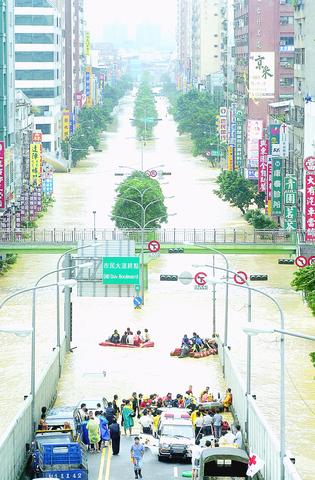Typhoon Nari pounded northern Taiwan yesterday, leaving as many as 34 people dead and families searching for missing relatives.
Across the nation, 94 people were reported injured as of press time last night.

PHOTO: LIAO RAY-SHANG, TAIPEI TIMES
More than 800,000 Taipei area families were left in the dark after the typhoon cut electricity supplies. Another 300,000 were left without a dial tone.
In addition to disrupted train and flight schedules, Taipei's mass rapid transit system was completely shut down due to heavy flooding at some stations along the Nankang-Panchiao line.
Nari, the 16th typhoon of the year and the third to make landfall, was expected to leave Taiwan at around 2pm today, moving in a south-westerly direction from Chiayi County.
The typhoon's heavy rainfall has resulted in the worst flooding in the greater Taipei area in 50 years.
According to the National Fire Administration, waters in some parts of Hsihchih in Taipei County rose three stories high. In Keelung the flooding was one story high.
Some low-lying areas in Taipei City were also flooded. They included the Neihu, Wenshan, Shihlin, Nankang, Hsinyi and Chungshan districts.
As of midnight, in Taipei City 16 people were reported dead and 80 injured, according to the National Fire Administration. In Taipei County, 10 people were reported dead while eight people were reported dead in Keelung. Others were still missing.
George Lu (呂國臣), a meteorologist at the Central Weather Bureau, said that Nari -- already dubbed the "weirdest storm in Taiwan's history" because of its unpredictable path -- broke many records in terms of its course, the duration of its stay and the amount of rainfall it delivered.
"While most typhoons travel in either a parabolic curve or straight line, Typhoon Nari trailed on a bow-shaped course back and forth in the Pacific Ocean," Lu said.
Lu added that it was because the typhoon traveled at such a slow speed -- 4kph to 6kph -- that a substantial amount of rainfall was recorded during its 40-hour visit.
"While the previous highest daily amount of rainfall in Taipei City was recorded at 358mm, we saw over 400mm yesterday alone," Lu said. "And while most typhoons linger for between 11 and 12 hours after making landfall, Nari has stayed for over 19 hours now," he said at about 5pm yesterday.
Inspecting one of the hardest hit areas in Hsichih, Premier Chang Chun-hsiung (張俊雄) called on other areas spared by the typhoon to help in relief efforts.
"We have mobilized the military to help in the relief efforts, and we definitely need more help from the public," Chang said.
Taipei City Mayor Ma Ying-jeou (
"I also call on the public to be patient with the city's efforts in pumping out water, because we have only a limited number of water pumps," Ma said.
Ma said the cause of yesterday's flooding was primarily the result of the extremely heavy rainfall rather than poor city infrastructure.
"I know it's not fair to say so because there's still plenty of room for improvement in the city's sewage system, but it's true that the city has never seen so much rainfall in one day," Ma said.

The US government has signed defense cooperation agreements with Japan and the Philippines to boost the deterrence capabilities of countries in the first island chain, a report by the National Security Bureau (NSB) showed. The main countries on the first island chain include the two nations and Taiwan. The bureau is to present the report at a meeting of the legislature’s Foreign Affairs and National Defense Committee tomorrow. The US military has deployed Typhon missile systems to Japan’s Yamaguchi Prefecture and Zambales province in the Philippines during their joint military exercises. It has also installed NMESIS anti-ship systems in Japan’s Okinawa

‘WIN-WIN’: The Philippines, and central and eastern European countries are important potential drone cooperation partners, Minister of Foreign Affairs Lin Chia-lung said Minister of Foreign Affairs Lin Chia-lung (林佳龍) in an interview published yesterday confirmed that there are joint ventures between Taiwan and Poland in the drone industry. Lin made the remark in an exclusive interview with the Chinese-language Liberty Times (the Taipei Times’ sister paper). The government-backed Taiwan Excellence Drone International Business Opportunities Alliance and the Polish Chamber of Unmanned Systems on Wednesday last week signed a memorandum of understanding in Poland to develop a “non-China” supply chain for drones and work together on key technologies. Asked if Taiwan prioritized Poland among central and eastern European countries in drone collaboration, Lin

Renewed border fighting between Thailand and Cambodia showed no signs of abating yesterday, leaving hundreds of thousands of displaced people in both countries living in strained conditions as more flooded into temporary shelters. Reporters on the Thai side of the border heard sounds of outgoing, indirect fire yesterday. About 400,000 people have been evacuated from affected areas in Thailand and about 700 schools closed while fighting was ongoing in four border provinces, said Thai Rear Admiral Surasant Kongsiri, a spokesman for the military. Cambodia evacuated more than 127,000 villagers and closed hundreds of schools, the Thai Ministry of Defense said. Thailand’s military announced that

NO CONFIDENCE MOTION? The premier said that being toppled by the legislature for defending the Constitution would be a democratic badge of honor for him Premier Cho Jung-tai (卓榮泰) yesterday announced that the Cabinet would not countersign the amendments to the local revenue-sharing law passed by the Legislative Yuan last month. Cho said the decision not to countersign the amendments to the Act Governing the Allocation of Government Revenues and Expenditures (財政收支劃分法) was made in accordance with the Constitution. “The decision aims to safeguard our Constitution,” he said. The Constitution stipulates the president shall, in accordance with law, promulgate laws and issue mandates with the countersignature of the head of the Executive Yuan, or with the countersignatures of both the head of the Executive Yuan and ministers or